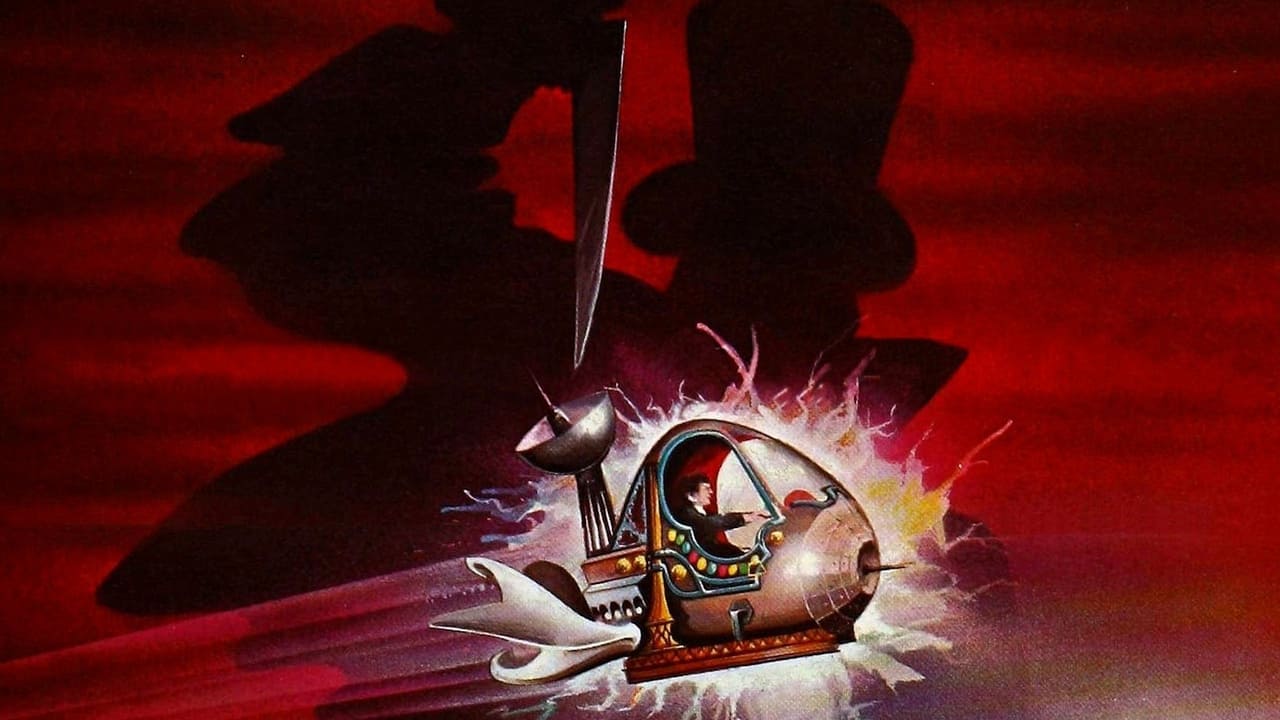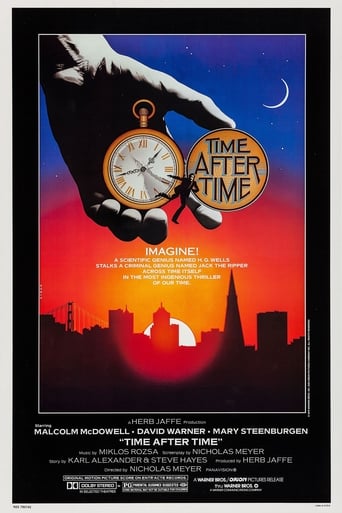CheerupSilver
Very Cool!!!
Stoutor
It's not great by any means, but it's a pretty good movie that didn't leave me filled with regret for investing time in it.
Guillelmina
The film's masterful storytelling did its job. The message was clear. No need to overdo.
Cody
One of the best movies of the year! Incredible from the beginning to the end.
maria nieves
Great acting, loved the setting and direction, costumes, music, and plot. I felt the film was risky to make, and the quality succeeded. Sometimes it feels like Dr. Who or a comic book.The suspense and tension is thick. Jack the Ripper is one scary villain. H.G. Wells is a great memorable hero.That said, the first act is a bit of a chore to get through. The Jack murder scenes take a while, too. So the movie feel like 3 hours. Also, I could not imagine recommending Time After Time to young people.The social commentaries were deep and it was awesome for a socialist like Wells to confront the not-so-Utopian future of 1979.
MartinHafer
"Time After Time" is the sort of escapist fantasy that you just need to suspend disbelief in order to enjoy--and very enjoyable this film certainly is. Additionally, it's quite romantic and is a movie I strongly recommend you watch.The film begins in London during the time of Jack the Ripper (David Warner). Coincidentally, the famous writer H.G. Wells (Malcolm McDowell) has just built a working time machine and the Ripper uses it to avoid being caught by the police. But Wells knows he cannot allow this maniac to escape and travels to 1979 in search of the murderer. There, Wells falls in love with a lady (Mary Steenburgen) and enlists her help to find the killer.This movie works for a variety of reasons. It's certainly one of McDowell's best performances and it's nice to see him being vulnerable and more multidimensional than his other famous roles (such as in "A Clockwork Orange"). The film also looks and sounds wonderful (with a lovely score by Miklós Rózsa) and is wonderfully directed by Nicholas Meyer. Well worth seeing and a rousing adventure that both men and women will likely enjoy.
sddavis63
I really wasn't expecting very much out of this, but after having watched "The Time Machine" I stumbled upon this movie and decided that I had to give it a try. It had a decent enough cast - Malcolm McDowell, David Warner and Mary Steenburgen being the stars (along with a very small part that lasts no more than a few seconds for a very young Corey Feldman), and while it seemed a bit (OK, a lot) silly, the basic story was at least a little bit intriguing. It has early sci-fi author H.G. Wells (author of "The Time Machine," played by McDowell) actually inventing a time machine. At a dinner party with some of his friends (similar to inventor George Wells in "The Time Machine") he reveals the existence of the machine, only to see it used by Dr. Stevenson (Warner) to escape into the future, because the police had discovered that he was Jack the Ripper. With the machine returning to Wells' lab after Stevenson had left it, Wells follows him into the future to prevent him from continuing his murderous spree in another time.Some things about the machine made little sense to me. Like in the original story, the machine doesn't move through space - only through time. That was established. But then Wells makes the comment that moving forward or backward in time depends on whether the machine is travelling eastward or westward. How can it be travelling in either direction if it doesn't move through space? And how, if it doesn't move through space, did the machine take both Wells and Stevenson to San Francisco in 1979? Just because it had been found and put on display in a San Francisco museum? Wouldn't where it ended up in the future be dependent on where it started? I was confused by all that to be honest. But, getting over that confusion, I found a story that was actually quite entertaining.It's exciting enough. Not edge of your seat stuff, but you do find yourself rooting for Wells as he tries to track down Stevenson, knowing that if the Ripper is left loose there's going to be a blood bath in San Francisco, which has already started by the time Wells arrives, two prostitutes having been murdered. The movie has an amusing "fish out of water" aspect to it as we watch Wells try to come to terms with this very new and different environment - 1979 San Francisco being much different than 1893 London, where he began. There was also a really nice chemistry between McDowell and Steenburgen, who meet as Wells exchanges some 19th century English pounds for American dollars. There's an attempt at linking the story to Wells' real life through Steenburgen. She plays Amy Robbins - and Wells really did marry a woman who was one of his students named Amy Robbins in 1895. So the story, which has them falling in love in 1979 in San Francisco and then returning to London in 1893 offers a sci-fi version of how the two met.I also found myself thinking about Nicholas Meyer, who directed this. Meyer is probably best known for his involvement with some of the Star Trek movies - and he helped write the screenplay for "Star Trek IV: The Voyage Home." It was also a time travel movie, with the crew of the Enterprise facing the same fish out of water experience in San Francisco. I wondered how much that screenplay might have been influenced by Meyer's work with "Time After Time." On the surface, this movie does sound silly. But it turns out to be a pretty well done and entertaining movie. (8/10)
lasttimeisaw
A fiction adventure of the Victorian writer H.G. Wells (McDowell), who time-travels to San Francisco in 1979 to capture the infamous Jack the Ripper aka. Dr. Stevenson (Warner), who uses Wells' newly-invented time machine to escape and keep slaughtering women in the city, meanwhile he gets hooked on a local bank clerk, a modern woman Amy Robbins (Steenburgen), whose life comes under threat during the cat-and-mouse chase, Wells has to rescue her and settles the old scores with Stevenson. For its own sake, the film leans more on a romantic adventure than a Sci-Fi no-brainer, predates the ultra-popular BACK TO THE FUTURE franchise (where Steenburgen also stars in its third installment), it pairs Wells' ungainly anachronism and old-fangled chivalry with Amy's active happiness-pursuing initiative from women's liberation movement, it is most tantalizing when the pair connects under an unconventional method when the woman takes the lead and not shies away about it, Amy's racy retort to Wells' polite concerning is "Forcing me? My God, Herbert, I'm practically raping you.", while Wells is an avant-garde exponent of free love, this is one significant aspect he envisions for a Utopian future. McDowell is innocuously likable with an unsophisticated urgency to right the wrong and Steenburgen acts with a distinctive drawl which sounds both seductive and peculiar, the two not just click wonderfully on screen, in reality, they also tied the knot in 1980, but eventually broke up after 10 years. As for Warner, his gore slashing atrocity is mostly dampened for not going to far, so his portrayal of the notorious killer is not startling enough, strangely, his final gesture even strikes as a tacit agreement with Wells, permits him a way out of an alienated real world. Then with regard to the time machine gizmo, it looks chintzy even compared with George Pal's THE TIME MACHINE (1960, 6/10). However in its London prologue, Wells laboriously clarifies how the machine functions, with an emphasis on two important devices, one is the key, which the passenger should keep with to prevent the time machine returns to its departure location after the mission; another is the vaporising equalizer, if it has been pulled out, the passenger will travel through time without the time machine, he will be stuck into an infinite dimension, so there is no coming back. The former grants the precondition of Wells' pursuit in the first place while the latter guarantees the demise of the evil Ripper like a cinch. Director-screenwriter Nicholas Meyer really makes an effort to make the story at least logically passable, unfortunately, the happenings in San Francisco do not deserve such treatment, the sloppiness of a museum without any security measurement, or how Amy stays put in the exact same place even she is fully aware a murder will befall upon her later is alternately frustrating and befuddling, all feel more slapdash is that the suspense has been honed up greatly owing to Miklós Rózsa's formidable symphonic score, if only the listless writers can squeeze their brain to confect a more believable scenario. So TIME AFTER TIME has its innate clumsiness, but it also has a beguiling goofiness underneath to greet new visitors, plus if you are really into time travel or Jack the Ripper, this amalgam may shred some dim delight.

